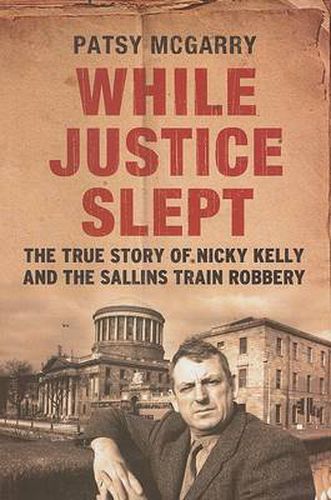Readings Newsletter
Become a Readings Member to make your shopping experience even easier.
Sign in or sign up for free!
You’re not far away from qualifying for FREE standard shipping within Australia
You’ve qualified for FREE standard shipping within Australia
The cart is loading…






It was one of the most notorious miscarriages of justice in the history of this State, yet there has never been an inquiry into how an innocent man signed a confession to one of the biggest mail train robberies in Ireland and was kept in jail by the Courts despite exhausting the appellate jurisdiction , as a Chief Justice put it. Though in a 1992 presidential pardon, Nicky Kelly was described as being as innocent as though never charged in relation to the 1978 Sallins mail train robbery, the Gardai’s conduct of its investigation in the case has never been explained; nor has that of a judiciary which sentenced him to 12 years penal servitude and kept him in jail, despite appeal after appeal, until there was political intervention. Nicky Kelly was failed at every turn by the justice agencies of this State. In an age when the most powerful democracy in the world has shown scant regard for basic justice rights, it is timely to ask: where are the mechanisms in Ireland to prevent a possible repeat of the Nicky Kelly case? In Free Nicky Kelly , Irish Times journalist Patsy McGarry talks to those who actually took part in the mail train robbery; gives an inside account by Nicky Kelly of what took place after his arrest, including his time on the run in Europe, Canada and the US; relates his return to Ireland and to jail, his prolonged hunger strike and the campaign which led to his release, his eventual pardon and compensation by the State; describes Nicky’s own international campaign on behalf of the Guildford Four and Birmingham Six; and raises the unanswered questions as to how it all could have happened. In Free Nicky Kelly , 30 years later, the full story of this miscarriage of justice can finally be told. This is a fascinating look at what can happen when a democratic state and some of its most important institutions - its Government, its judiciary, its intelligence services and police - panic before a perceived threat and then fail in upholding the basic principles of a democratic society. It’s a story that still resonates today.
$9.00 standard shipping within Australia
FREE standard shipping within Australia for orders over $100.00
Express & International shipping calculated at checkout
It was one of the most notorious miscarriages of justice in the history of this State, yet there has never been an inquiry into how an innocent man signed a confession to one of the biggest mail train robberies in Ireland and was kept in jail by the Courts despite exhausting the appellate jurisdiction , as a Chief Justice put it. Though in a 1992 presidential pardon, Nicky Kelly was described as being as innocent as though never charged in relation to the 1978 Sallins mail train robbery, the Gardai’s conduct of its investigation in the case has never been explained; nor has that of a judiciary which sentenced him to 12 years penal servitude and kept him in jail, despite appeal after appeal, until there was political intervention. Nicky Kelly was failed at every turn by the justice agencies of this State. In an age when the most powerful democracy in the world has shown scant regard for basic justice rights, it is timely to ask: where are the mechanisms in Ireland to prevent a possible repeat of the Nicky Kelly case? In Free Nicky Kelly , Irish Times journalist Patsy McGarry talks to those who actually took part in the mail train robbery; gives an inside account by Nicky Kelly of what took place after his arrest, including his time on the run in Europe, Canada and the US; relates his return to Ireland and to jail, his prolonged hunger strike and the campaign which led to his release, his eventual pardon and compensation by the State; describes Nicky’s own international campaign on behalf of the Guildford Four and Birmingham Six; and raises the unanswered questions as to how it all could have happened. In Free Nicky Kelly , 30 years later, the full story of this miscarriage of justice can finally be told. This is a fascinating look at what can happen when a democratic state and some of its most important institutions - its Government, its judiciary, its intelligence services and police - panic before a perceived threat and then fail in upholding the basic principles of a democratic society. It’s a story that still resonates today.